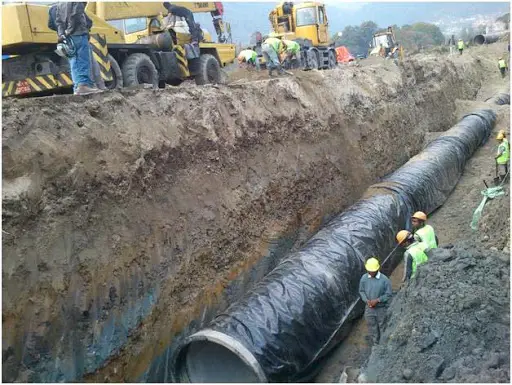The US$48 million Deka water pipeline project is well on track to be completed as per the timeline, according to the Zimbabwe Power Company (ZPC). The company has already built pipes covering more than 3 kilometers. It is almost done with the excavation work.
After an independent review of the project raised the costs from the intended $28 million, the pipeline supplies cooling water to the Hwange Power Station. A $48.5 million credit line from the Exim Bank of India is used to fund the project.
The 962mm pipeline will be parallel to the one that the Zimbabwe Electricity Supply Authority (Zesa) currently uses to supply water to the power station as well as the Hwange community.
ZPC has been working to upgrade the low and high lift pumps of the old Deka water pipeline. This has been done to draw water from the Zambezi River to Hwange Power Station. Hwange Power Station is the largest coal-fired power plant in Zimbabwe.
Read also: Agreement Signed for Construction of 7.8km Drinking Water Pipeline in Casablanca, Morocco
Given that ongoing efforts to expand the 920MW facility by another 600MW for $1,4 billion will increase water demand, Hwange Power Station will require much more water and a more effective transportation system to draw the water from the Zambezi River.
How essential is the Deka water pipeline project?
The Deka water project is important in this regard since the power station uses raw water from the Zambezi River for electrical generation and cooling.
There will be three tap-off points along the pipeline for the supply of potable water to the Deka community. The tap-off points will be in Makwa, Marshala, and Chachachunda. This will happen when the Zimbabwe National Water Authority water treatment (Zinwa) plant in Hwange is refurbished.
The vast power project is one of the key initiatives the nation is taking to achieve energy self-sufficiency. It will significantly promote the ambitions of the National Development Strategy (NDS1) and Vision 2030.
For the NDS1 goals and an upper-middle income society to be realized by 2030, the government has identified that a reliable supply of electricity is essential. It is anticipated that the Deka upgrade project will be completed by March 31, 2023. The project formally began last year in October.
The ground-breaking ceremony for the pipeline’s construction was officiated by President Mnangagwa in March of this year.
The project will boost the water supply to the power plant. The volume will increase from 3,500 cubic meters per hour to 6,000 cubic meters per hour.
The Deka water pipeline project is essential since it will support the Second Republic’s initiatives. It will raise electricity generation by tackling issues with the water supply.
The 3,555 mild steel pipes, that arrived in the country through the Beira port were all received at the site. The pipes, according to an update report from ZPC, were transported to Hwange by trucks.
The project’s completion
By March 31, 2023, ZPC added that the project would have been completed as scheduled. As of now, 95 percent of the excavation work has been completed. Also, 32 kilometers of the 42 kilometers of the pipeline have been installed.
As per ZPC, a total of US$13,7 million would have been invested at the conclusion of the project on local goods and services. They include surveys, general civil works, inland transportation, pipe laying and jointing, and pipe hydro testing. It will also involve commissioning and significantly promoting socioeconomic development.
The pipeline trench connecting the Hwange Thermal Power Station and the Deka waterworks is being dug as part of the excavation work.
Reported Dec 2016
Zimbabwe secures funding to upgrade mega water pump stations
The Government of Zimbabwe secured a $28,56 million loan facility for the upgrade and rehabilitation of the existing Deka water Pump Stations. Deka pumping stations are the sole source of water for ZPC’s Hwange thermal power station.
The Deka project is being implemented by India’s Water and Power Consultancy Services (WAPCOS), and Angelique of India was contracted as the Engineering Procurement Construction (EPC) contractor.
Angelique of India requested the Exim Bank of India (EBI) to implement the EPC contracting project in two phases because available funds were falling short by $11 million to do the whole project at once. The project has an initial estimated cost of $39 million.
Also read: Zimbabwe government to partner with South Africa on Zambezi Water Project
EPC turned down the request by the contractor and advised that it would carry out an independent assessment of the project. Zimbabwe Electricity Supply Authority (ZESA) Holdings CEO Mr. Josh Chifamba said the insistence of EBI for the project to be implemented in one go could result in the need for additional funding.
If the independent assessment confirms additional funding requirements, the additional funding will be subject to approval by the Government of India, through EBI, and the Government of Zimbabwe.
The two-phase implementation suggestion by the EPC contractor included the first phase covering 30,7 kilometers at a total cost of $22 million being available funds.
Part of the $28,56 million loan facility was utilized on works done by local companies to ensure continuous supplies of water to Hwange Power Station. The other portion was for the WAPCOS services, Mr. Chifamba confirmed.
The Deka project entails the upgrade and rehabilitation of the existing Deka Pumping Stations, the old raw water pipeline (42 km) supplying Hwange Power Station and associated infrastructure, as well as the installation of a new 42km pipeline. WAPCOS has completed 25 percent of the upgrade works on the project.

